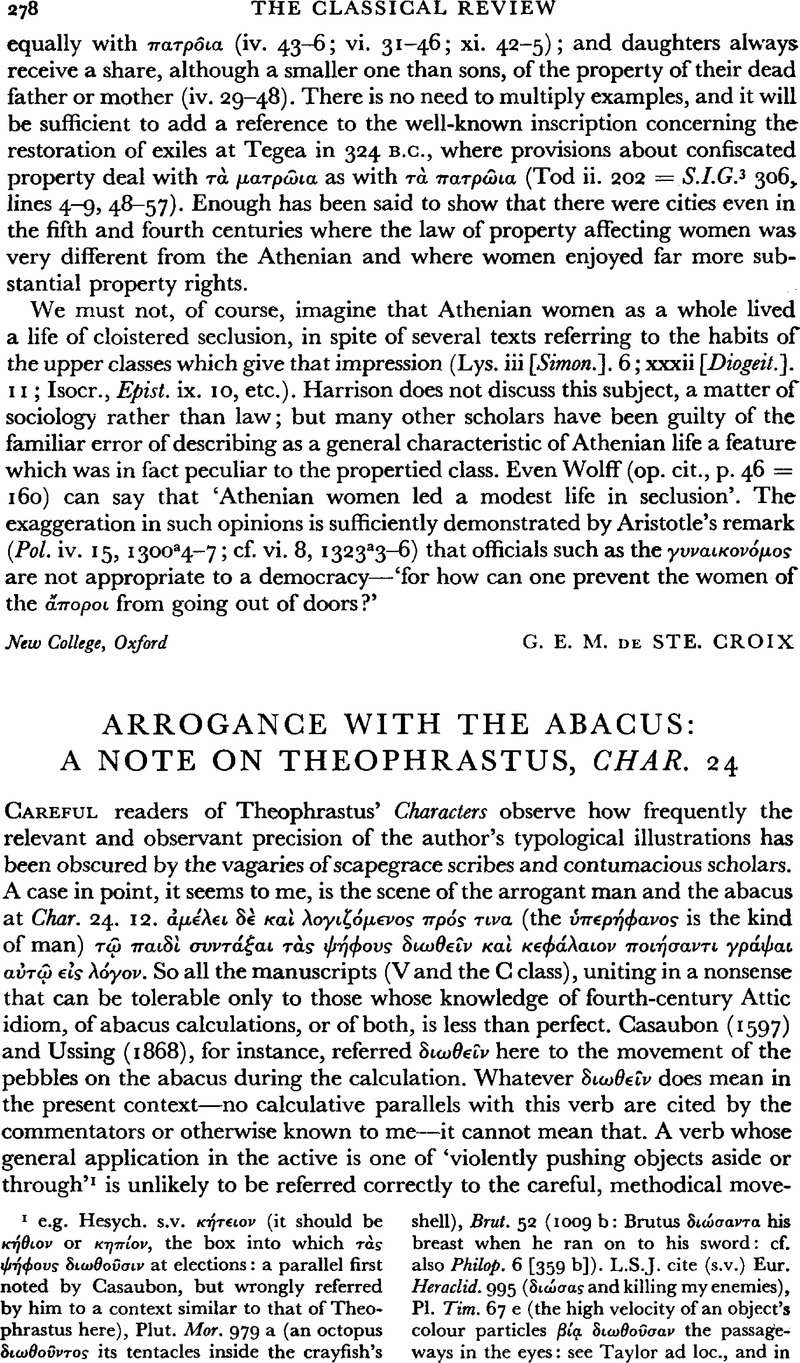No CrossRef data available.
Article contents
Arrogance with the Abacus: A Note on Theophrastus, Char. 24
Published online by Cambridge University Press: 27 February 2009
Abstract

- Type
- Review Article
- Information
- Copyright
- Copyright © The Classical Association 1970
References
page 278 note 1 e.g. Hesych. s.v. κ⋯τειον (it should be κ⋯θιον or κηπ⋯ον, the box into which τ⋯ςΦ⋯φους διωθο⋯σιν at elections: a parallel first noted by Casaubon, but wrongly referred by him to a context similar to that of Theophrastus here), Plut. Mor. 979 a (an octopus διωθο⋯ντος its tentacles inside the crayfish's shell), Brut. 52 (1009 b: Brutus διώσαντα his breast when he ran on to his sword: cf. also Philop. 6 [359 b]). L.S.J. cite (s.v.) Eur. Heraclid. 995 (διώσας and killing my enemies), Pl. Tim. 67 e (the high velocity of an object's colour particles β⋯ᾳ διωθο⋯σαν the passage-ways in the eyes: see Taylor ad loc, and in general Gaiser, K., ‘Platons Farbenlehre’, in Synousia: Festgabe für W. Schadewaldt [1965], i. 173 ff.)Google Scholar, and Polyb. xxi. 28. 14 (δiota;ωθο⋯ντες their pikes through holes in the defences).
page 279 note 1 See particularly Bücheler, , Jahrb. für Phil, cix (1874), 692 ffGoogle Scholar. = Kleine Schriften, ii. 81 f.
page 279 note 2 Hesperia, xxvi (1957), 271 ff., xxxiii (1964), 146 ff., xxxiv (1965), 224 ff. Cf. also Hultsch in R.E. s.v. Abacus, 9; and T. L. Heath, A History of Greek Mathematics, 1. 46 ff.
page 279 note 3 In his 1852 edition (p. 171) Sheppard proposed the palaeographically neat διαθεῖναι (a conjecture that was twice rediscovered—by Foss for his 1858 edition, and by Naber in Mnem. xx N.S. [1892], 334, whose closing remark in the circumstances is deliciously ironic, ‘admirabile est tantalum uitium per tot saecula non potuisse corrigi’), but the normal Greek idiom is τ⋯ς Φ⋯φους θεῖναι, not διαθεῖναι, as Navarre pointed out in his 1924 Commentaire (cf. Theoph. Char. 23, Dem. xviii. 229; Galiano prints τιθ⋯ναι accordingly in his recent edition). Neither Ast's διαθεῖν (tentatively, in his 1816 edition), nor Pauw's διοικεῖν, nor Bücheler's διελθεῖν deserves to be mentioned in a modern apparatus.
page 279 note 4 αὐτῷ here will be indirect reflexive (K.-G. i. 563 f.; Diels's conjecture αὐτῷ in his 1909 edition is strictly unnecessary, which is not to say that it must be wrong); tr. ‘to write it into the account for him’. Theophrastus does not say whether the arrogant man is the creditor or the debtor in this transaction, since that is totally irrelevant to the point. It is the method of the calculation, not its end product, that exemplifies ὐπερηφαν⋯α.
page 279 note 5 His (Loeb) edition of Theoph. Char., pp. 11 ff.


